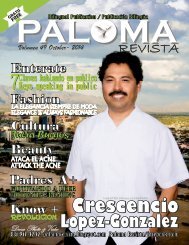You also want an ePaper? Increase the reach of your titles
YUMPU automatically turns print PDFs into web optimized ePapers that Google loves.
“NO LE PEGUES A TU HIJO”<br />
Pegarle al niño es mortificarlo y afligirlo. Se piensa que<br />
una nalgada de vez en cuando es necesaria. Esto no es<br />
verdad. Golpear a un niño le enseña a tener miedo, que<br />
puede ser abusado, a limitar sus habilidades de ser<br />
autónomo y responsable, a suponer que la violencia es<br />
justificada, a comportarse como víctima, a no razonar y<br />
aprender que existen cosas que se hacen "porque le da<br />
la gana" a alguien mas fuerte que el otro. En el plano<br />
emocional, después de las nalgadas, empujones,<br />
bofetadas, puños o paliza etc., los niños quedan heridos<br />
profundamente ante la humillación sufrida, con la<br />
autoestima disminuida y con un odio enfermizo porque<br />
lo sienten por sus seres queridos. Se auto percibe sólo,<br />
abandonado, triste y amenazado en su seguridad física y<br />
mental. Incluso las nalgadas consideradas “no muy<br />
fuertes” pueden causar daño físico. Los golpes en la<br />
parte inferior de la columna vertebral envían ondas de<br />
choque a lo largo de toda la columna, y pueden lesionar<br />
al niño, muchas veces hablamos y defendemos los<br />
derechos humanos porque todos hemos sido creados<br />
iguales. Nadie tiene el derecho de abusar o someter a<br />
otro ser humano o de golpearlo, torturarlo, humillarlo o<br />
avergonzarlo. y de repente en algunas familias se<br />
olvidan que un niño es precisamente ¡Un ser humano!<br />
Cuando el niño es maltratado asocia a sus familiares<br />
que lo agraden con el peligro y no puede amarlos a<br />
plenitud ni confiar en ellos. La comunicación familiar va<br />
desapareciendo y los vínculos de cariño<br />
y a f e c t o t a m b i é n .<br />
Estudios demuestran que los padres le pegan a sus hijos<br />
por distintas razones. Las más frecuentes son porque lo<br />
consideran parte de la educación de sus hijos, porque<br />
ellos mismos fueron maltratados cuando pequeños y por<br />
falta de control emocional y manejo de la ira. Los niños<br />
quedan heridos profundamente, con la autoestima<br />
disminuida y con un odio enfermizo por sus seres<br />
queridos. Si un niño nunca ve a sus padres resolver<br />
problemas de una manera creativa y humana, será difícil<br />
que él aprenda a hacerlo. Por esta razón, los patrones se<br />
repiten de generación en generación.<br />
Una educación amable, apoyada en una<br />
base sólida de amor y respeto, es la única<br />
manera efectiva de lograr un buen<br />
comportamiento cimentado en fuertes<br />
valores internos, ese un hogar de<br />
“buen comportamiento.”<br />
“DO NOT HIT YOUR CHILD”<br />
Hitting a child mortifies and distresses him. It is<br />
thought that a spanking occasionally is necessary.<br />
This is not true. Hitting a child teaches them to be<br />
afraid, that he can be abused to limit their ability<br />
to be independent and responsible, assume that<br />
violence is justified to act like a victim, not to<br />
reason and learn that there are things that are<br />
done "because he wants to" someone stronger<br />
than the other. On an emotional level after<br />
spanking, pushing, slapping, or beating fists etc.,<br />
children are deeply hurt at the humiliation, with<br />
diminished self-esteem and an unhealthy hatred<br />
that they feel for their loved ones. Perceived self<br />
alone, abandoned, sad and threatened his<br />
physical and mental security. Even spanking<br />
considered "not very strong" can cause physical<br />
harm. Bumps at the bottom of the spine send<br />
shock waves throughout the entire column, and<br />
can injure the child, we often speak and defend<br />
human rights because we are all created equal.<br />
No one has the right to abuse or subject another<br />
human or to beat, torture, humiliate or embarrass<br />
one. and suddenly in some families it is forgotten<br />
that a child is just a human being!. When a child is<br />
abused they associate it with their family members<br />
and danger and can not fully love them and trust<br />
them. Family communication begins disappearing<br />
and the bonds of love and affection, too.<br />
Studies show that parents beat their children for<br />
various reasons. The most common is because they<br />
consider it part of the education of their children<br />
because they themselves were abused as children<br />
and lack of emotional control and anger<br />
management. Children are deeply wounded, with<br />
diminished self-esteem and an unhealthy hatred for<br />
their loved ones. If a child sees his parents never<br />
solve problems in a creative and humane way, he<br />
learns to do so. For this reason, patterns are<br />
repeated from generation to generation.<br />
A good education, supported by a solid<br />
foundation of love and respect,<br />
is the only effective way to achieve<br />
a good behavior ground in strong<br />
inner values, the home of "good behavior."<br />
“no deprimas el espíritu de tu hijo, no le pegues”<br />
"not depressed the spirit of your child, do not hit him"<br />
10 831.917.4227 familia+cultura+religión+sociedad
















